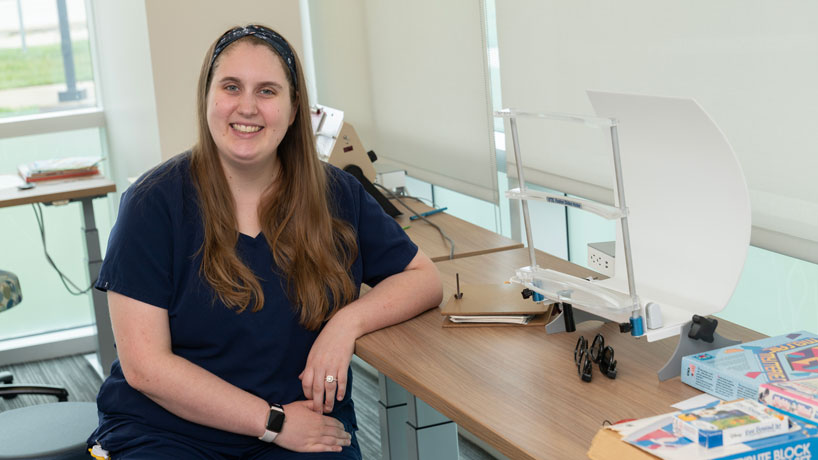
Dr. Katie Kyles, who graduated from the College of Optometry this spring and also participated in the Optometry Scholars Program, is continuing her work with the Pupil Project as a pediatric resident at UMSL. (Photo by Derik Holtmann)
Dr. Katie Kyles has known she wanted to pursue a career in optometry since she was in middle school. As a child, she was diagnosed with amblyopia (lazy eye) and wore an eyepatch. When she started high school, she began working for a practice and started researching the field of optometry. Enrolling in and graduating from the College of Optometry at the University of Missouri–St. Louis – and starting her residency at UMSL this summer – were natural next steps in her career.
“I learned pretty early that I was interested in vision therapy,” she said. “Learning about the different possibilities of how we can treat kids and adults with different eye issues like I had, I found really interesting. When I started researching optometry schools to apply to, I was looking for ones that had strong vision therapy programs. In looking at UMSL, I found the Pupil Project and their residency, and I was really drawn to that.”
Kyles was so set on pursuing vision therapy that she applied to UMSL’s College of Optometry after just three years as an undergraduate at St. Norbert College in De Pere, Wisconsin. She was accepted and ended up transferring credits back to eventually receive her bachelor’s degree in biology.
UMSL’s Pupil Project, in particular, piqued Kyles’ interest. A collaboration between the College of Education and College of Optometry, the Pupil Project brings together a multidisciplinary team of optometrists, school psychologists, special educators and physical therapists to manage learning-related vision problems in children.
“We look at psychoeducational testing and compare it to visual processing testing and look for vision-related learning disabilities,” Kyles said. “From there, we can recommend different interventions in terms of therapy or classroom accommodations. It involves intensive testing; the kids typically come for two two-hour sessions for the testing with us, and before that, they’ve had IQ and achievement testing. There’s a pretty decently sized waitlist currently of people waiting for these assessments. It’s a really cool program.”
As Kyles started learning more about vision therapy in lectures and labs, she was even more sure that was the path she wanted to pursue. She had also started having more vision-related issues of her own, which is not uncommon due to the increased workload and amount of reading in optometry school. Doing vision therapy as a patient, including working on eye tracking, teaming and focusing, further solidified her interest in vision therapy.
During the summer between her first and second years in the College of Optometry, Kyles also started in the Optometry Scholars Program, which helps participating students build upon their research experience by matching them with faculty members with similar research interests. She took an intensive statistics course with Dr. Erin Brooks and participated in a journal club to review research articles. Through the program, Kyles was also able to build on her work with the Pupil Project through organizational tasks such as data entry and statistical analyses of diagnostic testing. In particular, she and fellow Optometry Scholar Dr. Jaci Bongard, who is also doing her residency at UMSL, looked at skim-reading in dyslexic versus non-dyslexic populations and presented posters on the topic at the American Academy of Optometry during their third and fourth years.
When it came time to apply for residencies, Kyles said UMSL was a no-brainer.
“I really felt drawn to the residency at UMSL,” she said. “It’s very unique in terms of their dedication to vision-related learning disabilities. I knew that that was something I was passionate about, and looking at all the other residencies, there really weren’t a ton that touched on that at all. If I was going to spend a year somewhere, I wanted to make sure it was doing exactly what I wanted to do.”
As a pediatric resident, Kyles is continuing her work with the Pupil Project, conducting evaluations and extensive testing and also writing letters to participating schools about different accommodations needed for students. She also sees pediatric and binocular vision patients in clinic, does vision therapy and spends one day a week at St. Louis Children’s Hospital.
“I’ve really enjoyed everything that I’ve learned about vision-related learning disabilities, and I’m excited to be able to run tests and create a full image,” she said. “I’ve seen results before, but doing the whole thing start to finish is what I’m the most excited for.”
Inspired partly by her own relationship with her optometrist as a kid, Kyles has always been drawn to pediatrics and loves working with children in clinics now. She hopes to continue doing so after residency and is also interested in teaching, whether at an optometry school or at a clinic serving as an externship site for fourth-year students or residents.














